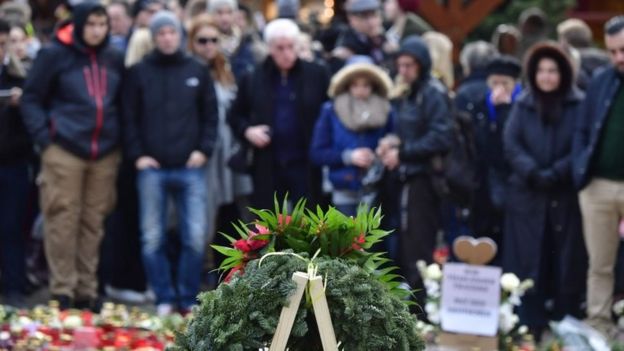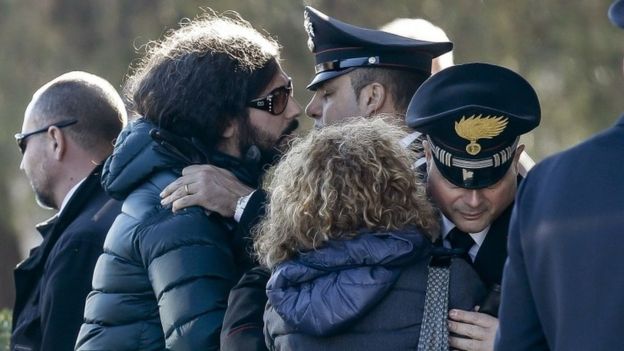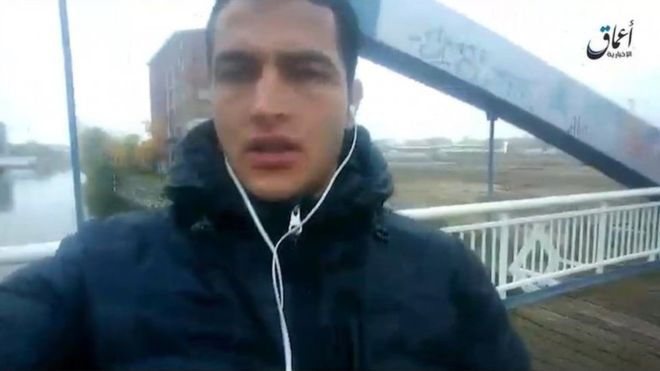Tunisian security forces have arrested the nephew of the Berlin market attacker Anis Amri and two other suspects, officials say.
The Tunisian interior ministry said the three, aged between 18 and 27, were members of a “terrorist cell”, and that they were detained overnight.
Tunisian-born Amri, 24, was shot dead by police near the Italian city of Milan in the early hours of Friday.
Monday’s lorry attack on the market left 12 people dead and 49 injured.
The interior ministry statement said Amri’s nephew – the son of his sister – had confessed that he had communicated with his uncle via the encrypted chat application Telegram to evade security surveillance.
It said the three-member cell had been active in the towns of Fouchana, outside Tunis, and Oueslatia near Amri’s hometown of Kairouan, about 150km (95 miles) south of the capital.
-
Berlin market attack: Anis Amri’s escape journey
-
What we know
-
The lorry attacker
-
Freedom or security, Berlin asks
 Image captionShoppers have been drawn to a makeshift memorial at the site of the Berlin Christmas market attack
Image captionShoppers have been drawn to a makeshift memorial at the site of the Berlin Christmas market attack
The statement added that Amri had sent money to his nephew to travel to Germany and join a jihadist group, and encouraged him to pledge allegiance to the so-called Islamic State (IS) group.
Meanwhile, intelligence services in Spain are investigating a possible internet communication between Amri and a Spanish resident on 19 December, Interior Minister Juan Ignacio Zoido told radio station COPE.
A looming threat: By Rana Jawad, Tunis
Tunisia has been under pressure to reform its security sector since it suffered from a spate of deadly attacks by IS militants in 2015.
With the help of countries including Germany and the UK, counter-terrorism operations and border security management have significantly improved, and the country has not witnessed a major terrorist attack this year.
But its nationals have been involved in some of the deadliest attacks to hit Europe this year. The attacks in Nice, and more recently in Berlin, were carried out by Tunisians who had moved to Europe long before IS existed, and neither appeared to have any Islamist ties before they left their homeland.
The latest arrests show that even if its nationals get radicalised abroad, that too can contribute to others joining their ranks from here. This is still a country that is contributing the largest number of militants in the region, and authorities here have not figured out how to put a stop to it.
Today, it is also facing the prospect of thousands trying to come back here as IS loses ground in some of its biggest strongholds in the region. People worry that the state is ill-prepared to deal with that influx, and there is concern over the threat that this looming reality poses domestically.
On Friday, IS released a video showing Amri pledging allegiance to its leader Abu-Bakr al-Baghdadi.
Amri was shot dead after opening fire on police officers during a routine police check in the Milan suburb of Sesto San Giovanni, after a three-day Europe-wide manhunt.
In the summer of 2015, a United Nations report said an estimated 5,500 Tunisians – mostly young people between the ages of 18 and 35 – were fighting in the ranks of terrorist organisations in Libya, Iraq, Syria and, to a lesser extent, Mali.
In November this year, the ministry of the interior in Tunis said about 800 fighters had returned to the country.
 Image captionThe coffin of Italian victim Fabrizia Di Lorenzo, accompanied by her mother and brother, has arrived in Rome
Image captionThe coffin of Italian victim Fabrizia Di Lorenzo, accompanied by her mother and brother, has arrived in Rome
Courtesy : BBC



